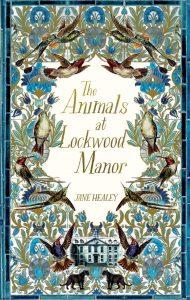 Amazon Affiliate Link | Bookshop.org Affiliate Link
Amazon Affiliate Link | Bookshop.org Affiliate Link If you like dark, historical novels with a brooding mystery at the center, you'll love Jane Healey's The Animals at Lockwood Manor. A queer novel set at a remote country estate in England at the beginning of World War II, the twists and turns of this novel-like the hallways at Lockwood Manor-will surprise you.
In 1939, war has just broken out across the world. In London, Hetty Cartwright is helping to evacuate and safeguard the natural history museum's vast collection of specimens. Her job is to transport and maintain the large collection of mammals to Lockwood Manor, the vast and daunting estate well beyond the blast zone of the blitz. However, once she arrives at Lockwood, Hetty encounters its cavernous hallways and dark corners alongside its unwelcoming and controlling Lord and his intriguing but allegedly frail daughter, Lucy.
Soon, Hetty realizes that keeping the animals at Lockwood safe entails far more than protecting them from bombs-despite the meddling of Lord Lockwood and the servants, strange things begin to happen at Lockwood; animals go missing, museum property is destroyed, and much worse. Something seems to be stalking Lockwood and the animals within it-and maybe even Hetty herself. Hetty's only consolation is the darkly beautiful Lucy, who is haunted by her own nightmares and demons. Soon, it falls to Hetty to protect Lucy and unravel the mystery of Lockwood Manor-are the grounds cursed and haunted by spirits, or could it possibly be something worse?
I very much enjoyed this book. Historical fiction set during any time period is a favourite genre of mine, but I especially like novels of WWII. Healey did an excellent job of bringing to life one little-known aspect of the war, and her narrow focus on these fictional events underscored the widespread effect of war on these characters. The setting was intriguing and haunting-a rambling, castle-like house on a remote estate filled with the hulking taxidermy forms of animals is the perfect setting for a creepy mystery like Healey's. I felt fully immersed in the world throughout the novel.
Hetty's character was an excellent perspective throughout the novel. While there are short, dream-like interjections from Lucy's perspective, these only add to the mystery. Hetty's voice is the primary vehicle through which we encounter the strange happenings at Lockwood and her headstrong, industrious personality was refreshing. She was someone who was easy to relate to, despite the historical setting, and it was exciting to unravel the mystery of this novel and its characters alongside her.
Lucy's character was similarly intriguing. One thing I felt unsatisfied with in this novel, however, was the romance. While Lucy and Hetty's partnership was enjoyable and relatively convincing, the discovery of their feelings for one another felt a bit stilted and indelicate. The novel seemed to lurch into a lesbian relationship rather than flow into one. While it is difficult to frame lesbian desire in a historical setting, I felt that, in this case, Hetty and Lucy declaring their love for one another was a bit too disjointed at times.
Nevertheless, the end of this novel was a lovely and haunting conclusion. Hetty and Lucy's partnership was far more grounded at the end of this novel, and overall I felt that the book was an exciting historical mystery with haunting elements that kept me guessing.
Please visit Jane Healey on Twitter and put The Animals at Lockwood Manor on your TBR on Goodreads.
Content Warnings: Trauma, verbal abuse, physical abuse, sexual abuse.
Rachel Friars is a writer and academic living in Canada, dividing her time between Ontario and New Brunswick. When she's not writing short fiction, she's reading every lesbian novel she can find. Rachel holds two degrees in English literature and is currently pursuing a PhD in nineteenth-century lesbian literature and history. You can find Rachel on Twitter @RachelMFriars or on Goodreads @Rachel Friars.